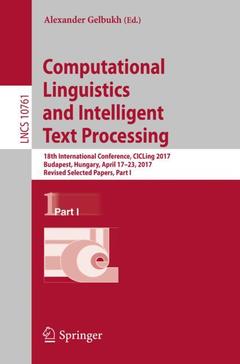Description
Computational Linguistics and Intelligent Text Processing, 1st ed. 2018
18th International Conference, CICLing 2017, Budapest, Hungary, April 17–23, 2017, Revised Selected Papers, Part I
Theoretical Computer Science and General Issues Series
Coordinator: Gelbukh Alexander
Language: English
Subject for Computational Linguistics and Intelligent Text Processing:
Keywords
artificial intelligence; emotion recognition; internet; learning algorithms; machine translations; natural language processing systems; neural networks; semantics; signal processing; social networking; speech recognition; supervised learning; text processing; translation (languages); world wide web
Support: Print on demand
Description
/li>Contents
/li>
The two-volume set LNCS 10761 + 10762 constitutes revised selected papers from the CICLing 2017 conference which took place in Budapest, Hungary, in April 2017.
The total of 90 papers presented in the two volumes was carefully reviewed and selected from numerous submissions. In addition, the proceedings contain 4 invited papers.
The papers are organized in the following topical sections:
Part I: general; morphology and text segmentation; syntax and parsing; word sense disambiguation; reference and coreference resolution; named entity recognition; semantics and text similarity; information extraction; speech recognition; applications to linguistics and the humanities.
Part II: sentiment analysis; opinion mining; author profiling and authorship attribution; social network analysis; machine translation; text summarization; information retrieval and text classification; practical applications.
General.- Overview of Character-Based Models for Natural Language Processing.- Pooling Word Vector Representations across Models.- Strategies to select examples for Active Learning with Conditional Random Fields.- Label-Dependencies Aware Recurrent Neural Networks.- Universal Computational Formalisms and Developer Environment for Rule-Based NLP.- Morphology and Text Segmentation.- Several ways to use the lingwarium.org online MT collaborative platform to develop rich morphological analyzers.- A Trie-Structured Bayesian Model for Unsupervised Morphological Segmentation.- Building Morphological Chains for Agglutinative Languages.- Joint POS Tagging and Stemming for Agglutinative Languages.- Hungarian particle verbs in a corpus-driven approach.- HANS: A Service-Oriented Framework for Chinese Language Processing.- Syntax and Parsing.- Learning to Rank for Coordination Detection.- Classifier Ensemble Approach to Learning in Dependency Parsing.- Evaluation and enrichment of Stanford Parser using an Arabic Property Grammar.- Word Sense Disambiguation.- SenseDependency-Rank: A Word Sense Disambiguation Method Based on Random Walks and Dependency Trees.- Domain Adaptation for Word Sense Disambiguation using Word Embeddings.- Reference and Coreference Resolution.- “Show me the cup": Reference with Continuous Representations.- Improved Best-First Clustering for Coreference Resolution in Indian Classical Music Forums.- A robust Co-reference Chain builder for Tamil.- Named Entity Recognition.- Structured Named Entity Recognition by Cascading CRFs.- Arabic Named Entity Recognition : A Bidirectional GRU-CRF Approach.- Named Entity Recognition for Amharic Using Stack-Based Deep Learning.- Semantics and Text Similarity.- Idioms: Humans or machines, it's all about context.- Dialogue act taxonomy interoperability using a meta-model.- Textual Entailment Using Machine Translation Evaluation Metrics.- Supervised Learning of Entity Disambiguation Models by Negative Sample Selection.- The Enrichment of Arabic WordNet Antonym Relations.- Designing An Ontology for Physical Exercise Actions.- Visualizing Textbook Concepts: Beyond Word Co-occurrences.- Matching, Re-ranking and Scoring: Learning Textual Similarity by Incorporating Dependency Graph Alignment and Coverage Features.- Text similarity function based on word embeddings for short text analysis.- Information Extraction.- Domain Specific Features Driven Information Extraction from Web Pages of Scientific Conferences.- Classifier-based Pattern Selection Approach for Relation Instance Extraction.- An Ensemble Architecture for Linked Data Lexicalization.- A Hybrid Approach for Biomedical Relation Extraction Using Finite State Automata and Random Forest-Weighted Fusion.- Exploring Linguistic and Graph based Features for the Automatic Classification and Extraction of Adverse Drug Effects.- Extraction of Semantic Relation between Arabic Named Entities Using Different Kinds of Transducer Cascades.- Semi-supervised Relation Extraction from Monolingual Dictionary for Russian WordNet.- Speech Recognition.- ASR Hypothesis Rerarnking using Prior-informed Restricted Boltzmann Machine.- A Comparative Analysis of Speech Recognition Systems for the Tatar Language.- Applications to Linguistics and the Humanities.- Interactive Data Analytics for the Humanities.- Language Technology for Digital Linguistics: Turning the Linguistic Survey of India Into a Rich Source of Linguistic Information.- Classifying World Englishes from a lexical perspective: A corpus-based approach.- Towards a Map of the Syntactic Similarity of Languages.- Romanian Word Production: An Orthographic Approach Based on Sequence Labeling.




